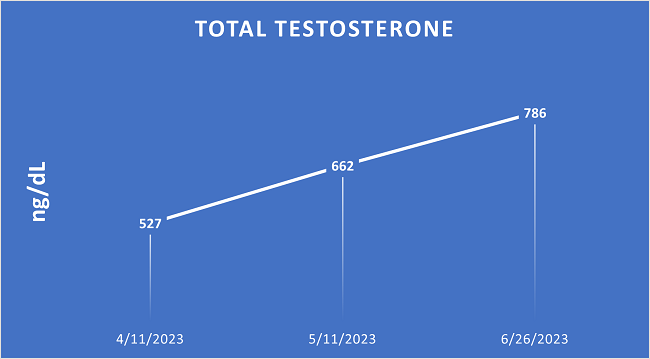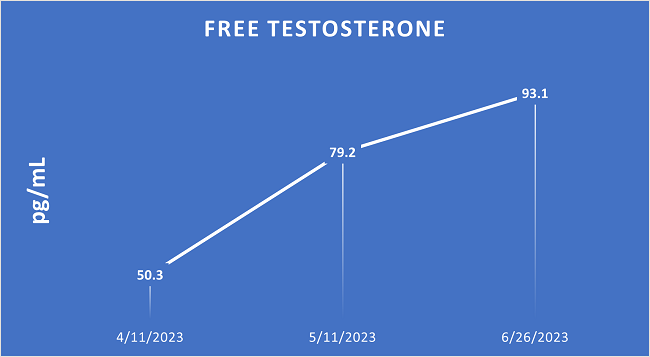Zinc is an essential mineral required for numerous biochemical processes such as DNA and immune system regulation, structure formation that includes collagen synthesis, and regulation of steroid hormone synthesis. The mechanisms for these zinc-dependent processes are in-part shown within the DNA whereby zinc acts as a factor for gene transcription. In addition, zinc regulates how proteins are made, and acts as a co-factor for proteins/enzymes such as angiotensin converting enzyme (ACE).
Testosterone is a steroid hormone that controls cell signals important for both males and females. It is synthesized at a much higher rate in males and is well known for its positive effects on muscle protein synthesis and mass. Testosterone is of particular importance for development of male secondary sexual characteristics, and promotes maturation and release of sperm. This hormone is made within Leydig cells of the testis in males. Because of this, zinc is considered to be an essential mineral for fertility and fertilization. The reduction of this mineral causes Leydig cells to become morphologically smaller with apparent abnormal cellular structures that include the endoplasmic reticulum.
Like other steroid hormones, testosterone is synthesized from cholesterol followed by circulation in plasma. These hormones are mostly bound to specific transport proteins (e.g., sex hormone-binding globulin) leaving a small fraction as “free” hormones. Free steroid hormones are able to produce physiological effects by binding steroid nuclear receptors found in the cytoplasm or the nucleus of cells. Interestingly, binding of nuclear receptors to DNA requires zinc-finger motifs (small regions of a protein structure). In addition, testosterone is converted to the more biologically active form, dihydrotestosterone, by the zinc-dependent enzyme 5-alpha-reductase.
Zinc Deficiency and Low Testosterone
Multiple clinical and animal studies have strongly demonstrated the connection between levels of zinc and its relation to circulating testosterone levels. For example, one meta-analysis study included 38 manuscripts (8 clinical and 30 animal) concluded that zinc deficiency reduces levels of testosterone. In addition, they found that zinc supplementation improves testosterone levels. Another study showed that serum testosterone levels were much higher in men who supplemented with zinc for 3-6 months (3.7 fold increase) Therefore, zinc is required for three important factors regarding levels of testosterone:
- Functionality of nuclear steroid receptors by zinc finger motifs.
- Conversion of testosterone to its more biologically active form, dihydrotestosterone, by action of zinc-dependent enzymes.
- Biosynthesis of testosterone.
How does zinc control testosterone biosynthesis? Testosterone is secreted by Leydig cells which produce 0.17-0.35 mmol/24hrs after stimulation with luteinizing hormone (LH). LH is stimulated by a hypothalamus hormone (GnRH) in both males and females. In females, this same hormone (LH) stimulates ovulation at mid-menstrual cycle. At the biochemical levels, the synthesis begins with cholesterol which undergoes a convoluted cascade of steroid hormone chemical “adjustments” thereby producing a variety of steroids. These are mediated by cytochrome P450 enzymes and lead to production of steroid hormones including: pregnenolone, progesterone, cortisol, and DHEA. In a zinc deficiency, some of these cytochrome enzymes that lead to testosterone production, such as P450scc, become downregulated.
In addition, zinc controls storage and secretion of multiple enzymes, including enzymes that depend on zinc for function. These enzymes are involved in cell signaling and for the activity of certain proteins that bind to DNA. An example would be the ACE enzyme, which contains zinc in its structure and is therefore zinc dependent. Zinc deficiency impairs ACE’s activity which leads to reduction of testosterone levels, followed by reduced sperm production. Zinc also plays a role in how LH receptors signal, and a chronic deficiency will induce oxidative stress within Leydig cells. Because of this, with zinc deficiency, Leydig cells are able to uptake cholesterol but cannot convert it properly to testosterone.
Case Study: Pyroluria With Zinc Deficiency and Low Testosterone
This is a follow up from the previously presented case of a young man who was diagnosed with pyroluria (or Hemopyrrollactamuria “HPU”). This individual presented with multiple zinc-deficiency related symptoms that also matched with symptoms of low testosterone. Zinc RBC levels showed marked reduction of intracellular zinc, while other mineral levels were in range (copper, selenium, magnesium). The patient was deficient in zinc even after initiating lower doses of zinc (daily 7-15 mg) for 8 months prior to these results. The patient began a treatment of 60-80 mg of daily zinc glycinate taken at nighttime. He experienced significant bodily changes within one week. These included deepening of his voice, new hair growth on arms, and substantial increase in libido. After one month of continued positive changes, it was shown that his total testosterone levels increased by 135, while the free testosterone increased by 29 which is significant and correlates with positive bodily changes.
Increase in Total and Free Testosterone With Zinc Supplementation
The patient continued to take zinc supplements. He is still experiencing the positive changes, and there was no reduction in any of the positive changes previously reported. The patient was asked to measure total/free testosterone levels, now about 2.5 months into treatment. Due to circadian variation, blood levels of testosterone were evaluated from a morning draw. Testosterone, like zinc, is affected by circadian variation with a peak around 09.00 hr and trough at 18.00 hr. Studies show a variation of testosterone levels as much as 30% between 08.00 and 16.00 hr.
The results show continued increase of total and free testosterone levels (see figure). Specifically, total testosterone increased to 786 ng/dL, and free testosterone increased to 93.1 pg/mL. This accounts for an overall 49% and 85% increase for total and free testosterone over baseline, respectively. It is important to mention here that the patient did not have any major changes to his diet, supplement, or exercise regimen other than addition of high doses of zinc (initially 80 mg, and currently at 90 mg zinc glycinate). It is worth noting here that this patient likely had much lower testosterone levels 8 months prior to this treatment. This is because he had already commenced on 15 mg of zinc for 8 months prior to the 04/11/2023 blood draw. However, he clearly needed more zinc which was being selectively depleted due to HPU.


Conclusion
Zinc is an essential mineral and has been clearly demonstrated in clinical, animal, and biochemical studies to be involved in the synthesis of testosterone. Testosterone levels can be affected by various dysfunctions, including genetic factors and mineral deficiencies. The case presented here demonstrates that reduced levels of testosterone in adult males should include zinc deficiency analysis in the differential diagnosis. Zinc RBC assessment is preferable over plasma/serum levels for reasons previously detailed. Because of the risk (minor in this case) for zinc-induced copper depletion, future tests for this patient will include zinc and copper assessment to monitor sufficiency status and confirm that his copper levels have not been significantly altered.
We Need Your Help
More people than ever are reading Hormones Matter, a testament to the need for independent voices in health and medicine. We are not funded and accept limited advertising. Unlike many health sites, we don’t force you to purchase a subscription. We believe health information should be open to all. If you read Hormones Matter, and like it, please help support it. Contribute now.
Yes, I would like to support Hormones Matter.
Image credit: Evgeny Gromov; iStock 1249586196
This article was published originally on July 24, 2023.















Hi,
lets say your testes have shrunken due to opiates ,zinc defeciency etc
can they regrow or go back to normal testosterone levels and higher if zinc + vitamins?
I just read your article on testosterone and zinc. I have really low levels of testosterone and zinc makes my stomach upset. Even just 10mg. Any reasons why? I did test positive for a few mycotoxins, Lyme, bartonella and a couple other infections also.
Hi Way,
You might want to consider different types of zinc. Some don’t react well to liquid zinc (stomach pain) but do much better with zinc bisglycinate. If this doesn’t help then the next step is to start small (5 mg) with big meals and increase the dose to tolerance. Low stomach acid can also be a source of gastrointestinal distress, which by itself is a symptom of zinc deficiency. If the latter is the case (i.e., low acid induced by low zinc), then this should improve as you continue to replete zinc. I suspect with your infections that you probably have low acid due to inflammation and nutrient depletion. Consider using Betaine-HCl with your food and zinc until you can tolerate zinc by itself.
Do you think it’s a good idea to supplement with both zinc and copper or just zinc? I’m attempting to come off TRT and looking for any help I can find to reboot the system. I’ll be using Clovis to start and then may implement HCG and/or peptides to get things ramped back up. I know zinc plays an important roll and now that my diet and lifestyle are optimized, I’m ready to see what happens. Appreciate your thoughts and the article.
Hi Troy,
Both will be important, as copper is involved in energy mechanisms and the production of other hormones like DHEA. In this specific case, copper was normal and so there was no reason to supplement with extra copper, at least initially.
My advice is, avoid guessing when possible. So what I would do is as soon as you stop TRT, run a good comprehensive panel to check on all nutrient levels. This would be of paramount importance for natural increase of testosterone. Discuss with your physician the following, or at least run the tests and show it to them:
[CBC, CMP, Thyroid panel to infer hormone and iodine levels (TSH, fT3, fT4, tT3, tT4), zinc RBC, copper RBC, copper plasma, copper ceruloplasmin. You can also do DHEAs and potentially think about using DHEA replacement, if low (DHEA cream for example).]
Once you check the above, then you can get a better idea for zinc/copper with regard to dosage. It is also good to get a base line for total/free testosterone after stopping TRT.
Implement corrections for any nutrient deficiency, then add HIIT once or twice a week (preferably short sprints). If you are truly zinc deficient, then I anticipate that you should see a gradual rise of testosterone with high doses of zinc, with higher increase if other supplementary nutrients/exercise are added.
Thank you. I really appreciate the response.